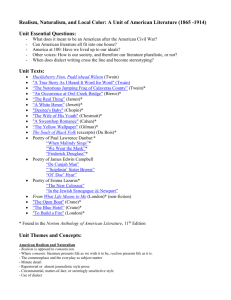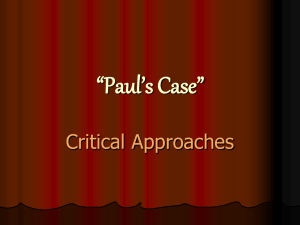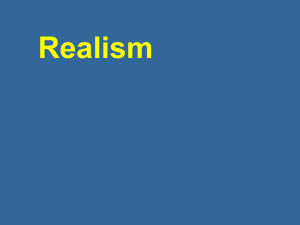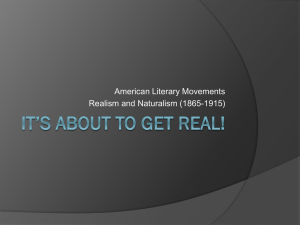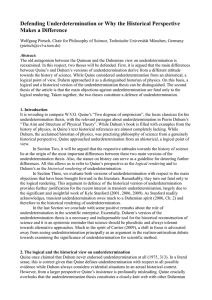Final Exam Study Questions—Philosophy of Science (3412), Spring 2008
advertisement
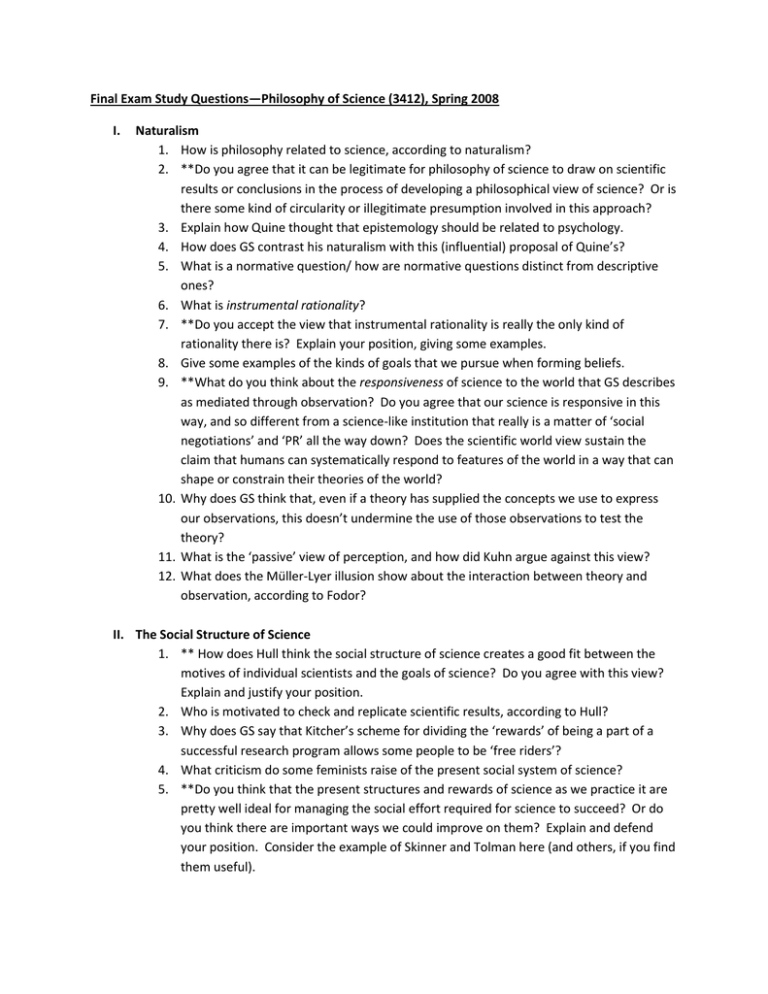
Final Exam Study Questions—Philosophy of Science (3412), Spring 2008 I. Naturalism 1. How is philosophy related to science, according to naturalism? 2. **Do you agree that it can be legitimate for philosophy of science to draw on scientific results or conclusions in the process of developing a philosophical view of science? Or is there some kind of circularity or illegitimate presumption involved in this approach? 3. Explain how Quine thought that epistemology should be related to psychology. 4. How does GS contrast his naturalism with this (influential) proposal of Quine’s? 5. What is a normative question/ how are normative questions distinct from descriptive ones? 6. What is instrumental rationality? 7. **Do you accept the view that instrumental rationality is really the only kind of rationality there is? Explain your position, giving some examples. 8. Give some examples of the kinds of goals that we pursue when forming beliefs. 9. **What do you think about the responsiveness of science to the world that GS describes as mediated through observation? Do you agree that our science is responsive in this way, and so different from a science-like institution that really is a matter of ‘social negotiations’ and ‘PR’ all the way down? Does the scientific world view sustain the claim that humans can systematically respond to features of the world in a way that can shape or constrain their theories of the world? 10. Why does GS think that, even if a theory has supplied the concepts we use to express our observations, this doesn’t undermine the use of those observations to test the theory? 11. What is the ‘passive’ view of perception, and how did Kuhn argue against this view? 12. What does the Müller-Lyer illusion show about the interaction between theory and observation, according to Fodor? II. The Social Structure of Science 1. ** How does Hull think the social structure of science creates a good fit between the motives of individual scientists and the goals of science? Do you agree with this view? Explain and justify your position. 2. Who is motivated to check and replicate scientific results, according to Hull? 3. Why does GS say that Kitcher’s scheme for dividing the ‘rewards’ of being a part of a successful research program allows some people to be ‘free riders’? 4. What criticism do some feminists raise of the present social system of science? 5. **Do you think that the present structures and rewards of science as we practice it are pretty well ideal for managing the social effort required for science to succeed? Or do you think there are important ways we could improve on them? Explain and defend your position. Consider the example of Skinner and Tolman here (and others, if you find them useful). 6. What changes happening in science today does GS suggest might threaten the balance between rewards and scientific contributions that has worked so well over the last few centuries? III. Realism 1. **Do you believe there really are electrons? Just what does this belief come to—what does it mean to say that there really are such unobservable things? Discuss why you take the position you do. 2. What (according to GS) is common sense realism? 3. What is Devitt’s version of scientific realism? 4. **Could scientific realism lead us to reject common-sense realism? Discuss/ defend your position. Consider in particular what GS has to say about quantum mechanics and its potential implications for a link between acts of observation and how things ‘stand’ with the world. 5. What is the pessimistic (meta-)induction? 6. What understanding of scientific realism does GS favour? 7. Why does McMullin think different kinds of confidence are justified, regarding different domains of science? 8. What is the ‘no miracles’ argument for realism? 9. Why does GS use the phrase ‘accurate representation’ rather than ‘truth’ when he characterizes the goal of science? 10. What is the ‘underdetermination of theory by evidence’? 11. What is instrumentalism? 12. **What is GS’s objection to van Fraassen’s position on the goal of science? Do you agree with GS? Explain your position & discuss. IV. Explanation 1. Why do empiricists often object to the idea that science aims to explain as well as describe? 2. What is the covering law theory of explanation? 3. Define explanandum and explanans. 4. How does the covering law account of explanation relate explanations to predictions? 5. Explain the asymmetry problem for the covering law theory. 6. **Does the asymmetry of causation really solve the asymmetry problem for explanation? Discuss—including worries about the nature of causation and ideas about how causation and explanation might be related. 7. What does the unificationist say is involved in explanation in science? 8. **How do different fields of science go about establishing standards for good explanations? Consider Kuhn’s example of Newton’s theory of gravity and GS subsequent discussion (cf. p. 198f). 9. What is contextualism? 10. How does GS describe ‘explanatory inference’? 11. How does a Humean regard laws of nature and causal relations? 12. How does Cartwright regard the ‘laws of physics’? V. Evidence and Confirmation 1. What is Earman’s attitude towards Bayesianism? 2. What idea about the relation between evidence and hypotheses makes it tempting to treat our ideas about evidence in a probability-based way? 3. State Bayes’ theorem in its simplest form. 4. When would we say (on this picture of evidence) that some evidence e confirms a hypothesis h? 5. What do we need to have in hand (i.e. to already know) in order to calculate the conditional probability of h on e? 6. Why are philosophers more worried about how we know (or arrive at) prior probabilities than about how we know (or arrive at) likelihoods? 7. What is the subjectivist view of probabilities? 8. Why is GS worried about the lack of constraints on prior probabilities in subjectivist Bayesian accounts of rationality? 9. What special reason does GS give for his reservations about relying on convergence in the Bayesian way? 10. Why does GS think studying eliminative inference can help us to clarify both successes and failures in scientific reasoning? 11. How does GS draw on the issue of ravens and how many (if not all) of them are black to illustrate his procedural naturalism? 12. **How does GS apply the idea of procedural naturalism to suggest a response to the grue problem? Do you think this account works? Why, or why not? VI. Empiricism, Naturalism and Realism? 1. Why did an early reviewer of GS’s book suggest the combination of empiricism, naturalism and scientific realism would turn out to be a ‘muddy paste’? 2. How does underdetermination create problems for empiricist forms of realism? 3. How does GS propose to reform empiricism? 4. How does the naturalist understand our (sensory) ‘access’ to the natural world? 5. **Is it enough to defend against underdetermination by pointing out that we can reliably identify the causes of many of our sensory experiences despite the technical fact that many different arrangements of items in the world can produce the same sensory effects? Can a natural view of our senses allow us to overcome such underdetermination? Discuss. 6. How do different societies and groups differ on the evaluation and adoption of ‘big ideas’ about the world? Give some brief examples. 7. How does the social organization of science as it has come to be conducted contribute to this process of evaluating big ideas? (There are two dimensions involved here...) 8. **What is an ‘engine of self-correction’? How does it involve a balance between criticism and trust? Between cooperation and competition? Do you agree that science has achieved a (reasonable degree of) balance here? Or is science (as Feyerabend argued) too authoritarian today? Discuss. 9. How does GS contrast the practice of alchemy with the practice of science? 10. **Empiricism can be criticized as giving a misleading view of how experience contributes to science—why does GS think it’s still worth hanging on to this term as part of his account of science? Do you agree? Discuss.

